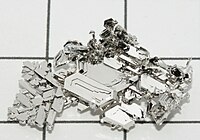
Photo from wikipedia
OBJECTIVE AURELIA, a randomized phase III trial of adding bevacizumab (B) to single agent chemotherapy (CT) for the treatment of platinum-resistant recurrent ovarian cancer, demonstrated improved progression free survival (PFS)… Click to show full abstract
OBJECTIVE AURELIA, a randomized phase III trial of adding bevacizumab (B) to single agent chemotherapy (CT) for the treatment of platinum-resistant recurrent ovarian cancer, demonstrated improved progression free survival (PFS) in the B+CT arm compared to CT alone. We aimed to evaluate the cost effectiveness of adding B to CT in the treatment of platinum-resistant recurrent ovarian cancer. METHODS A decision tree model was constructed to evaluate the cost effectiveness of adding bevacizumab (B) to single agent chemotherapy (CT) based on the arms of the AURELIA trial. Costs, quality-adjusted life years (QALYs), and progression free survival (PFS) were modeled over fifteen months. Model inputs were extracted from published literature and public sources. Incremental cost effectiveness ratios (ICERs) per QALY gained and ICERs per progression free life year saved (PF-LYS) were calculated. One-way sensitivity analyses were performed to evaluate the robustness of results. RESULTS The ICER associated with B+CT is $410,455 per QALY gained and $217,080 per PF-LYS. At a willingness to pay (WTP) threshold of $50,000/QALY, adding B to single agent CT is not cost effective for this patient population. Even at a WTP threshold of $100,000/QALY, B+CT is not cost effective. These findings are robust to sensitivity analyses. CONCLUSIONS Despite gains in QALY and PFS, the addition of B to single agent CT for treatment of platinum-resistant recurrent ovarian cancer is not cost effective. Benefits, risks, and costs associated with treatment should be taken into consideration when prescribing chemotherapy for this patient population.
Journal Title: Gynecologic oncology
Year Published: 2017
Link to full text (if available)
Share on Social Media: Sign Up to like & get
recommendations!